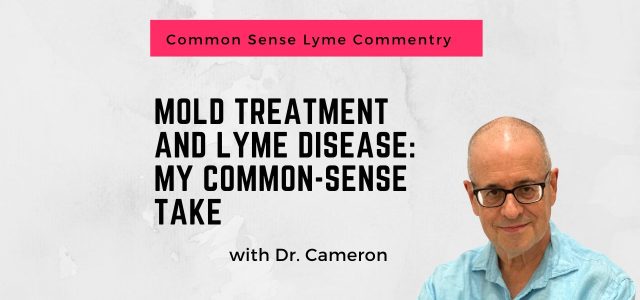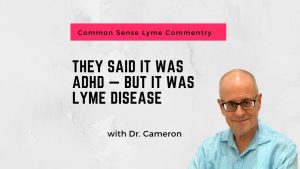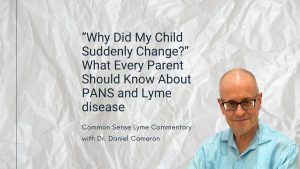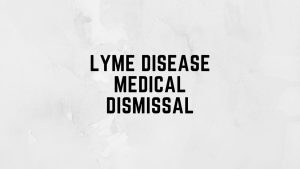
It’s a fair concern. Mold toxicity has received growing attention, and some patients with chronic Lyme disease are told that mold is the real issue—or that detoxing from mold is the missing link.
But in my experience, treating mold without addressing a persistent tick-borne infection seldom leads to sustained improvement.
So let’s break it down—in the form of a clinical dialogue.
💬 A Clinical Dialogue on Mold, Mycotoxins, and Lyme Disease
Cameron: One of my patients came to me after months of fatigue, dizziness, and brain fog. She said, “My doctor thinks it’s all mold-related. But I tested positive for Lyme, too. Could mold be causing everything?”
Colleague: Mold exposure can definitely worsen symptoms—especially in someone already battling an infection. But it’s not always the primary issue.
Cameron: That’s what I’ve seen. Mold can be part of the picture. But when I focus only on mold and ignore a persistent Borrelia or Babesia infection, patients don’t get better—or they relapse.
Colleague: So you see mold as a compounding factor?
Cameron: Exactly. Mold may impair the immune system, worsen inflammation, or trigger mast cell activation. But in my practice, it’s rarely the root cause. Once I treat the infection, many mold-sensitive patients stabilize—even without aggressive detox protocols.
Colleague: What about patients with a history of mold illness?
Cameron: I take it seriously. When mold is a concern, I refer patients to professionals who specialize in environmental and mycotoxin evaluation. But I always ask: “Is this patient sick because of mold—or is mold just adding fuel to an untreated infection?”
🔬 What the Research Shows
-
Mold exposure (especially to mycotoxins like ochratoxin A or trichothecenes) can cause fatigue, cognitive symptoms, and immune dysregulation.
-
Patients with chronic Lyme often develop heightened sensitivities—including to mold, chemicals, and foods—especially when co-infections are present.
-
There’s no evidence that mold treatment alone resolves persistent Lyme disease.
-
Treating mold without treating the infection can lead to partial, short-lived improvement—or none at all.
⚖️ Why Clinical Judgment Still Matters
-
Mold may exacerbate symptoms, but it is often not the source of illness.
-
Lyme, Babesia, and Bartonella can mimic or magnify mold-related symptoms.
-
Overemphasis on mold detox may delay effective treatment.
-
I’ve seen patients go through mold protocols for years—with little change—until we addressed their infection.
🩺 What I Do in My Practice
-
I refer patients to mold and environmental specialists when mold exposure is considered.
-
I evaluate for persistent Lyme disease and co-infections like Babesia or Bartonella.
-
I prioritize antimicrobial and antiparasitic treatment when clinical evidence supports it.
-
I address mold when necessary, but I seldom see lasting improvement when mold is treated without also addressing a persistent infection.
-
My focus is on treating what I can verify—starting with the infection—and then supporting recovery step by step.
🧭 Final Thoughts
Mold can make Lyme disease symptoms worse—but mold is not Lyme disease.
If symptoms persist despite mold protocols, it’s worth asking: “Is there a persistent infection underneath it all?”
In my practice, patients make the most progress when we stop chasing symptoms—and start treating the underlying infection.



Dr. Cameron, greetings! How much have you used Ivermectin as an anti-Lyme disease measure?
I have been following the research but have not included ivermectin in my protocols.
Do you have a common sense approach on the topic of heavy metal toxicity and Lyme disease?
One clinician told me that in the past he did quite a bit of treatment resulting in very little benefit.
Is this something that is being oversold?
I have been following the research but have not included MOLD in my protocols
Please add a way for me to repost this and other of your important info on LinkedIn and when we post there, let’s tag our gov’t and medical leaders. I just got a reply from a senator to a post on LinkedIn and now have over 2000 see some of my posts.
You have been doing great work for decades and it is so appreciated!!! Now is a golden opportunity as there is a big disruption at HHS, NIH that can be great or can be chaos.
Why arent doctors recquired to treat lymes disease when it is questioned on the board exams?
The Board questions have focused on early Lyme from what I have heard
I am a veteran. I have testing done by IGenix proving active and post infectiion antibodies since 2022. The VA is supposed to be starting to to recognize and treat veterans with chronic lymes but their testing is inferior and does not even show active lymes let alone antibodies from past infections.
Is it the same for metals as in do you treat Lyme and co first? I’m so confused. I also don’t know how safely I can treat metals. I’m single mum cannot afford to run risk of redistribution. Confused on itchy feet too I’ve developed after stopping Lyme treating and focussing on detox so no idea if it’s Lyme, b12 deficiency, diabetes or detox?!
I focus on treating Lyme and co-infections first